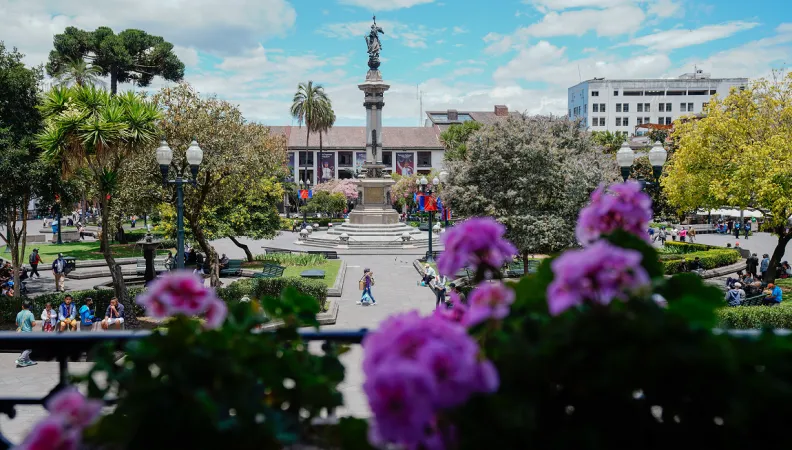 Ecuador is one of the 60 countries followed by AFD’s country-risk economists, whose assessments shed light on countries' economic trajectories and macroeconomic and financial situations.
Ecuador is one of the 60 countries followed by AFD’s country-risk economists, whose assessments shed light on countries' economic trajectories and macroeconomic and financial situations.
Context
Ecuador is a middle-income country facing many challenges, including significant political instability, declining socio-economic performance since the fall in oil prices in 2014-2015, and a macroeconomic situation vulnerable to exogenous shocks. To support a sustainable and less volatile development trajectory, AFD works in many sectors: water and sanitation, education, energy transition, sustainable urban development and support for civil society action.
Goal
Produced by AFD's team of risk-country economists, country assessments provide an analysis of development processes in countries in which AFD operates. They also characterize their growth trajectory, and detect economic, social, political and financial vulnerabilities associated with these trajectories. AFD Group is thus in a position to properly measure the challenges and monitor the risks associated with each of its investments.
Emphasis is placed on developing countries, particularly in Africa, for which macroeconomic analyses are rare or infrequent. AFD seeks to complement existing production on the global economic situation, more focused on advanced economies and major emerging countries.
Find out more: Macroeconomic Analyses at AFD
Method
Country-risk analysis is based on a close follow-up over a long period of time and rooted in a fine knowledge of local contexts. Cyclical trends, often highlighted in the news, are always examined in the light of structural trends and of the regional context in which they take place. The aim is to highlight country-specific macroeconomic issues while assessing risks against comparable time- and space-based trajectories.
Country-risk economists place the study of socio-political vulnerabilities, the growth model, the viability of public debt, external balances and the soundness of the financial system at the heart of their assessment, and give specific attention to countries' exposure to climate risks.
Lessons learned
Beyond the cyclical upheavals (linked in particular to the volatility of oil prices) that led the country to fail several times over the last two decades, the Ecuadorian economy is characterized by many structural challenges. It is, relative to peer countries, uncompetitive and unproductive, which hinders the development of sustainable growth drivers. Dollarization, which has allowed macroeconomic stabilization, requires significant budgetary discipline to ensure the sustainability of public debt, which is regularly threatened. However, high political instability is holding back reforms and an economic paradigm shift – even as people’s expectations are high to improve a declining standard of living since 2015.
Download our publications on the macroeconomic situation of Ecuador:
- “Ecuador: A narrow path out of the crisis”, in MacroDev Panorama n°36, September 2021
- “Twenty years of official dollarization in Ecuador: A blessing or a curse?”, MacroDev n°31, July 2020 (also available in French and Spanish)
Contact
-
Benoît JONVEAUX
Country Risk Economist
Discover other research projects
 As part of the ENSLAC project, AFD is working with Yes Innovation and its partners to study and identify replicability levers for nature-based solutions in three South American countries – Ecuador, Colombia and Peru. Fifteen initiatives are analyzed in order to understand how natural ecosystems are mobilized in urban areas, what are their impacts and how nature-based solutions (NBS) could be more widely integrated into spatial and urban planning.
As part of the ENSLAC project, AFD is working with Yes Innovation and its partners to study and identify replicability levers for nature-based solutions in three South American countries – Ecuador, Colombia and Peru. Fifteen initiatives are analyzed in order to understand how natural ecosystems are mobilized in urban areas, what are their impacts and how nature-based solutions (NBS) could be more widely integrated into spatial and urban planning.
Context
Latin America is the second most urbanized region in the world, with 81% of its population concentrated there. This strong urbanization, its rapid growth and the weakness of urban planning policies affect areas of high ecological and environmental value. However, natural ecosystems can be a source of solutions for those involved in urban design and development, in particular to respond to the risks generated or exacerbated by climate change.
Understanding nature-based solutions (NBS), studying their implementation conditions and analyzing their integration into public policies is therefore necessary to ensure the livability of cities in the long term. While NBS and green infrastructure are still recent in the urban landscape, initiatives have been deployed for several years and are a privileged source of data to exploit.
This project is part of the ECOPRONAT research programme, which supports research on how to better take into account biodiversity and mainstream it into key economic sectors.
Objectives
The ENSLAC (Enabling Nature based solutions Scale-up in Latin American Cities) project aims to analyse the mechanisms that enable the scale-up of nature-based solutions implementation in Latin American cities, drawing on 15 case studies in Peru, Colombia and Ecuador. This research approach aims to:
- Analyze the challenges of ecological restoration for the management of risks related to the impacts of climate change in urban areas;
- Understand the levers for using NBS as a tool for urban planning and development;
- Identify the temporal, technical, cultural, political, social, financial and cooperative processes that have enabled large-scale NBS-based projects;
- Assess the influence of national or supranational strategies and policies on NBS development;
- Disseminate the knowledge produced by focusing on formats and channels that can be used for the training of urban development actors.
To explore these issues, Yes Innovation, based in Quito, works with the Humboldt Institute for Biological Resources Research, an institution linked to the Ministry of the Environment of Colombia, and Periferia Territorios Vivos, a Peruvian organization specialized in urban planning with an ecological approach.
Method
This research project uses two analytical tools (depending on the case study and the available field data):
- Temporal and spatial analysis (known as BA/CI, which refers to a Before/After and Conservation/Intervention analysis);
- Comparative analysis between case studies on NBS and reference cases of comparable characteristics but without implementation of NBS.
Results
The ENSLAC research project aims to:
- Understand mechanisms that enable scale-up of nature-based solutions as a tool for urban and peri-urban planning;
- Identify replicability levers of these NBS for Latin American cities;
- Produce training materials for urban development actors.
The research team presented its findings during a webinar from the Research Conversations series. The replay is available below (in French and Spanish).
Find out more
Contact
-
Julien CALAS
Research Officer on Biodiversity






